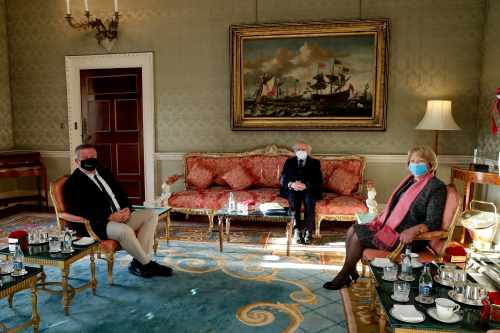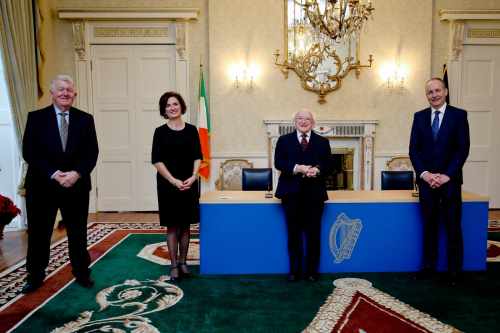Speech at the opening of the BT Young Scientists exhibition
12th January, 2022
May I offer my congratulations to all of the students participating in this year’s Young Scientist and Technology Exhibition, and pay tribute too to their teachers and parents and, of course, all those who have played a role in organising the event. Comhghairdeas libh go léir.
In a time when the importance of science has perhaps never been more recognised as an important tool in public health, as we continue to deal with a pandemic, a public health emergency, the Young Scientist Awards have an importance in gaining an ever-more necessary awareness of our dependence on science and technology. The Young Scientist, as it is known every year, helps to promote and encourage interest in science, technology, engineering and mathematics, and so much more. It communicates and, in ever new ways, demonstrates their relevance in everyday life. The Awards and Exhibition, now in its 58th year, has provided opportunities for young people across our country to participate and be inspired by science engagement activities in their schools and homes.
The Young Scientist Awards have rightly earned their place as an annual highlight in the school calendar over the decades and have indeed been a cause for much celebration. By looking to the discipline of science – physics, chemistry, biology – and the inter-disciplinary applications in related technological, engineering and mathematics fields, solutions may be discovered that can assist in the solving of so many of the great challenges we face in our contemporary society. In doing so, you young scientists are engaging in positive and, indeed, often critical and urgently required endeavours of collective action. Science and its results in technology are never neutral. The application, delivery and purpose of its possibilities is inescapably a moral issue I suggest.
We are fortunate in Ireland to have so many young people who create the promise, as well as the possibility, of becoming the problem solvers, critical thinkers and persistent pursuers of the possibilities of tomorrow. You, the citizens of the future, are so essential as a source of hope for the crafting of a shared and better life for all who inhabit this fragile planet.
Science and COVID
What an exciting and indeed challenging time it is to become ever-more involved in science and its application in society, and on a global basis with global benefit. The COVID-19 pandemic has reaffirmed the critical importance of science as a vital tool for humanity, both to combat the transmission of the Coronavirus, and to reduce the suffering and tragedy to which it gives rise. Of course, the value and necessity of using scientific insights is not solely confined to public health pandemics, such as COVID-19, but it is important if we are to address so many of the great challenges facing humanity, indeed all those forms of live on our planet.
Science and Society
Science now requires, more than ever, that its application and endeavour be rooted in the social and the ethical. It requires a reorientation, perhaps even a paradigm shift, so that it may help with best effect for all in the solving of the great social challenges of our times. This has been occurring in many areas of science and scientific endeavour already, and it must continue, and with even greater urgency.
You young scientists must be concerned as to what model of connection between science and society you are making your contribution. You will be remembered if your contribution was one to an ethical society, if the results of science and technology were allowed to flow for general human benefit and with a consideration, above all, for ecological responsibility.
A great challenge for science, and those who work in the disciplines, will be to develop technological and scientific solutions that can address our great contemporary challenges, and do so in acceptance of global benefit and reach, how to engage with the policy system, and ensure that such advancements are deployed equitably in the parts of the world that need them most.
Science can play such a significant role in almost all of the great challenges we face as a global community of citizens, from the climate change crisis – the greatest threat we face, an existential threat – to the related issues of environmental degradation and biodiversity loss, global poverty, hunger, famine, malnutrition, inequality, to name just a few.
I think of Irish-born biologist and Nobel Laureate, William C. Campbell from Donegal, who, when working for Merck Institute for Therapeutic Research, pioneered an unprecedented drug donation programme with the World Health Organisation, with the intention of wiping out river blindness. An estimated 25 million people were being treated each year, in a total of 33 countries in sub-Saharan Africa, Latin America, and the Middle East. The disease has now been eradicated in several countries, including Colombia, Ecuador, and Mexico.
To quote Professor Campbell,
“The greatest challenge for science is to think globally, think simply and act accordingly. It would be disastrous to neglect the diseases of the developing world. […] We have a moral obligation to look after each other […]”
Science and Africa
Science has a potentially enormous role to play in the future life of our most populated continent: Africa, the continent of the young, accounting as it does for 20 percent of the young people of the world, a continent of almost 1.4 billion people. It is a continent on which the hopes of so much of our shared future rests, where we could see the achievement of the United Nations Sustainable Development Goals, provide an adequate response to climate change, reduce hunger and poverty, deliver healthy living conditions and universal basic services, including education and healthcare, and achieve the connection between economy, society, ecology and culture that we so urgently need and cannot postpone.
Science can play a vital role in delivering all of this transformation, but central to its success will be the transfer of science and technology on equitable terms. The shameful failure that the inequitable distribution of COVID-19 vaccines represents illustrates just how far we have to go in this regard.
It is you who have to achieve this different paradigm for the delivery of your work. Your generation now has the opportunity of redefining the relationship between science, technology and society. What a tragedy it has been in the past to have had the brightest scientific intelligences captured for the armaments industry, or as advocates for some of the major polluters of the world, or in activities that lead to the poisoning of sources of food and water and even the air we breathe. The COVID pandemic has perhaps reminded us of the intrinsic moral nature and potential for good that science at its best offers humankind.
Albert Einstein remarked, “The important thing is never to stop questioning”. That remark encapsulates the very essence of science, its raison d’être. Science is the search for the ‘lightbulb moment’. Perhaps the most interesting thing about science is that it is never finished. Every discovery leads to more questions, new mysteries, to something else that needs explaining. It is a powerful reminder of ‘the more we know, the more we must seek to know’.
Social History of Science
The social history of modern science, particularly the way it acquired social legitimacy, clearly depicts the significance of the relationship between science and society emerging from the time of Galileo. The social institution of science has evolved as one of the most powerful, highly influential and sought-out institutions, but it is now undergoing a major change, owing to globalisation, transformations brought about by the transition of industrial to post-industrial societies, and of course new and emerging global threats, such as climate change and the COVID pandemic.
Science itself is a method, one, as I said earlier, that is never neutral in its purpose or application. Science not only hopes to solve problems, but also it identifies them. It is a mark of our civilisation as to how we define and use it.
Science and Active Citizenship
Activities such as the Young Scientist Awards, demonstrate an active citizenship on the part of the students taking part, your families, teachers and others who have supported you in your scientific enquiries and discoveries. Such active citizenship contributes greatly to an inclusive Republic, one in which all citizens are encouraged to participate as active members engaged in the shaping of an inclusive, flourishing, enlightened society and sustainable economy, one informed by the power of evidence. May I encourage you all to help each other and co-operate in advancing the truly emancipatory potential of science for society and for all of life.
May I conclude then by congratulating again all those who participated in the year’s Awards and Exhibition, and it is my hope that such participation will further fuel your interest and determination to continue to play a role in science, its application, and its delivery for the betterment of society.
I wish you all a Happy New Year.
Traoslaím libh uilig, gach dalta agus scoil atá ag glacadh páirt. Beir beannacht.


